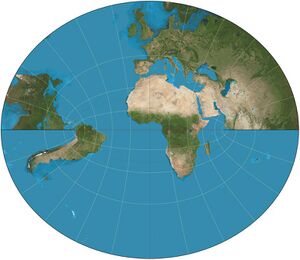Littrow projection
The Littrow projection is a map projection developed by Joseph Johann von Littrow in 1833. It is the only conformal, retroazimuthal map projection. As a retroazimuthal projection, the Littrow shows directions, or azimuths, correctly from any point to the center of the map.
Patrick Weir of the British Merchant Navy independently reinvented the projection in 1890, after which it began to see more frequent use as recognition of its retroazimuthal property spread. Maps based on the Littrow projection are sometimes referred to as Weir Azimuth diagrams.[1]
The projection transforms from latitude φ and longitude λ to map coordinates x and y via the following equations:[2]
- [math]\displaystyle{ \begin{align} x &= R \frac {\sin \left(\lambda - \lambda_0\right)}{\cos \varphi} \\ y &= R \cos \left(\lambda - \lambda_0\right) \tan \varphi \end{align} }[/math]
where R is the radius of the globe to be projected and λ0 is the longitude desired for the center point.
See also
References
- ↑ Snyder, John P. (1993). Flattening the Earth: 2000 Years of Map Projections. Chicago: University of Chicago Press. p. 135.
- ↑ Snyder, John P.; Voxland, Philip M. (1989). An Album of Map Projections. Professional Paper 1453. Denver: USGS. pp. 231. ISBN 978-0160033681. https://pubs.er.usgs.gov/usgspubs/pp/pp1453. Retrieved 2014-09-27.
External links
 |


